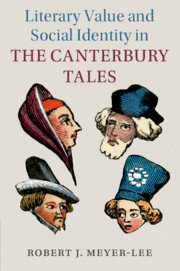Book contents
- Literary Value and Social Identity in the Canterbury Tales
- Cambridge Studies in Medieval Literature
- Literary Value and Social Identity in the Canterbury Tales
- Copyright page
- Dedication
- Contents
- Acknowledgments
- Abbreviations
- Introduction
- Chapter 1 Clerk
- Chapter 2 Merchant
- Chapter 3 Squire
- Chapter 4 Franklin
- Notes
- Works Cited
- Index
- Cambridge Studies in Medieval Literature
Introduction
Canterbury Tales IV-V and Literary Value
Published online by Cambridge University Press: 15 October 2019
- Literary Value and Social Identity in the Canterbury Tales
- Cambridge Studies in Medieval Literature
- Literary Value and Social Identity in the Canterbury Tales
- Copyright page
- Dedication
- Contents
- Acknowledgments
- Abbreviations
- Introduction
- Chapter 1 Clerk
- Chapter 2 Merchant
- Chapter 3 Squire
- Chapter 4 Franklin
- Notes
- Works Cited
- Index
- Cambridge Studies in Medieval Literature
Summary
After presenting book’s justification, the introduction articulates its central argument: that the four-tale sequence of Clerk, Merchant, Squire, and Franklin enacts a dynamically unfolding, conflicted meditation on how literary value may be construed in a way that justifies the time, energy, and expense devoted to the writing of fiction - a justification made in respect to other activities pertaining to other values, especially to economic value in the sense of making a living. The introduction then considers the metacritical stakes and implications of this argument along the methodological dimension of the bearing of manuscript evidence on the principles of Chaucer interpretation and the conceptual dimension of the problem literary value. The former consideration reviews the manuscript basis for the book’s claim about the four-tale sequence; the latter consideration indicates theoretical debts (to, e.g., Bruno Latour and Georg Simmel) and introduces several key terms used throughout the book (the most important: literary axiology, axiological person, and axiological logic), explaining the relation of these terms to more traditional ones of Chaucer criticism.
Keywords
- Type
- Chapter
- Information
- Publisher: Cambridge University PressPrint publication year: 2019

